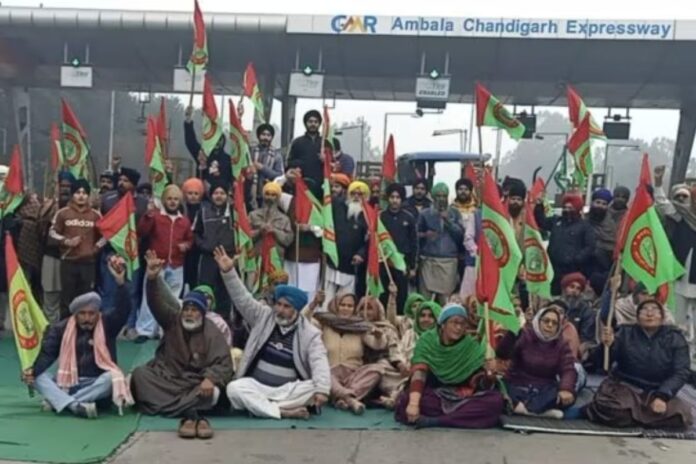Punjab Bandh brought the state to a standstill on Monday, as the Kisan Mazdoor Morcha (KMM) and Samyukt Kisan Morcha-Non-Political (SKM-NP) called for a nine-hour protest from 7 am to 4 pm. Roads were blocked, and train services, including Vande Bharat, were disrupted at over 250 locations. The protest, which demanded a legal guarantee for MSP, left railways and industries incurring significant losses.
Impact on Transportation
The Punjab Bandh led to the cancellation of 172 train services, while 232 others were disrupted, causing massive revenue losses for the railways. Farmers blocked major roads using tractors and trolleys, leaving commuters stranded and halting industrial activity.
“We can’t have Punjab be labelled a ‘protest state,’” said Badish Jindal, convenor of the All Industries and Trade Forum. “We are hardworking people and cannot afford to ruin our economy.”
Industries Bear the Brunt
Industries across Punjab faced heavy losses, estimated to be in crores. Many factories operated partially or remained shut as workers were unable to reach their workplaces due to roadblocks.
Upkar Singh, president of the Chamber of Industrial and Commercial Undertakings (CICU), explained, “Most factories either could not work or they operated partially. We are with farmers, but they also need to be with the industry.”
Pankaj Sharma, president of the Association of Trade and Industrial Undertakings (ATIU), added, “The loss incurred due to today’s bandh could go beyond Rs 500 crore. Such disruptions harm trade and industry and affect future investments.”
Public Confrontations and Shop Closures
Several confrontations occurred between shopkeepers and farmer union members who forced businesses to close. In Ludhiana’s Salem Tabri area, markets reopened after brief closures, but in other districts like Barnala and Ferozepur, private and public banks were forcibly shut.
Sunil Mehra, general secretary of Punjab Pradesh Beopar Mandal, highlighted, “The state is already grappling with an economic slowdown. Traders and farmers are the backbone of Punjab’s economy and must work together.”
Ayush Aggarwal, state secretary of Beopar Mandal, noted, “These blockades have disrupted the movement of goods, increasing export costs and impacting competitiveness in national and international markets.”
Political and Union Leaders React
Industrialist and BJP leader Gurdeep Singh Gosha criticized the disruptions, saying, “The green turban symbolizes prosperity, but now union leaders with this identity seem to have other agendas.”
Darshan Pal, president of Krantikari Kisan Union (KKU), confirmed his union’s support for the bandh. “Our union supported the bandh call, and in 12 districts, our members participated in it,” he stated.
Sarwan Singh Pandher, coordinator of KMM and SKM-NP, emphasized that the bandh had public support and denied allegations of coercion. However, incidents like the blockade of GT Road in Ludhiana and effigy burning in 16 districts by Bharti Kisan Union-Ugrahan were reported.
Economic Toll of the Bandh
The bandh’s economic impact was widespread. Industries, which are primary contributors to GST collection, suffered significant disruptions. Punjab’s debt burden of over Rs 3.5 lakh crore makes such losses harder to absorb.
“The government must ensure business activities are not hampered. Farmer leaders should hold peaceful dharnas without disrupting normal life,” Pankaj Sharma asserted.
Farmer union members entered factories to halt production, further aggravating the situation. Emergency services were also affected, drawing criticism from various sectors.
Call for Unity Among Stakeholders
Leaders from trade and industry urged farmers and the government to collaborate. “We appeal to farmers to avoid actions that harm one section while benefiting another,” said Sunil Mehra.
The bandh highlighted a growing need for balance between farmers’ demands and the economic well-being of the state. As industries and traders continue to bear the brunt of protests, stakeholders called for constructive dialogue to address these recurring disruptions.

